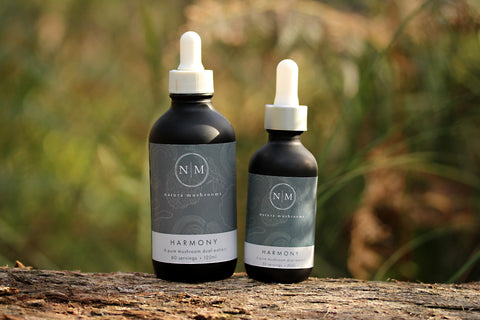Mushrooms are well and truly having a moment.
And this moment extends far beyond your typical shiitake, portobello and button mushrooms you find in the produce section of your local supermarket.
Lately, lesser-known medicinal varieties like reishi, chaga, cordyceps and lion’s mane appear to be popping up in everything —from powders to extracts to smoothies and even skin care.
While the trend has only recently caught on in the Western world, cultures in the east have been using medicinal mushrooms for thousands of years for their therapeutic and nutritional value.
But with over 2,000 different varieties, the world of medicinal mushrooms can be difficult to navigate, and you’d be forgiven for wondering… are medicinal mushrooms even safe?
Well, get your flippers and snorkel ready — we’re about to dive in.
The good stuff… what are medicinal mushrooms?
Medicinal mushrooms can be defined as macroscopic fungi, used for medicinal or nutritional purposes, typically in the form of an extract or powder.
They have all the good stuff in them called “active compounds” which support a healthy immune system. They also have what’s called “active polysaccharides” (and a lot of them), with the most common one being beta-glucan which works to trigger changes in the immune system. We’re talking the activation of immune cells, reduced inflammation, and increased antibody production.
But not only that, mushrooms produce a whole lot of chemical compounds that act as defenders of the body, useful for fending off bacteria and other bodily invaders that make us unwell. Fungi have even produced some of our most important modern medications including penicillin — the groundbreaking drug that changed the world of medicine!
So the thing is, medicinal mushrooms are really good for you.
Like, really, really good.
The kind of really, really good that can lower cholesterol, improve heart health, reduce inflammation, increase energy and stamina, and activate the immune system. And that’s just the beginning of a long list of really, really good things.
The not-so good stuff… Do medicinal mushrooms have side effects?
Now, we could talk about the benefits of medicinal mushrooms until the cows come home.
But are medicinal mushrooms always safe?
While we want to steer clear of the word *always* for obvious reasons. The truth is, very few side effects of medicinal mushrooms have been reported throughout research. And those that have are quite rare and mild.
Cordyceps (found in some of our products including Cordyceps Mushroom Liquid Extract and the Invigorate Blend Liquid Extract) has been linked in some instances to mild diarrhoea, constipation, and stomach discomfort.
Similar side effects have been found in people consuming Turkey Tail (found in our Turkey Tail Liquid Extract and Harmony 6 Mushroom Blend) and Reishi (found in our Reishi Mushroom Powder and Harmony 6 Mushroom Blend). In saying that, many of these studies were in people undergoing cancer treatment, so it’s unclear whether the symptoms were due to the mushrooms or the treatment itself.
Studies show that while Chaga (found in our Chaga Liquid Extract) has shown no side effects on the typical consumer, it could potentially pose risks for people with other health deficiencies. See, one of Chaga’s main health benefits is that it helps to lower blood sugar, which could potentially cause issues for those on insulin or with diabetes. Chaga also contains a protein that can help with circulation and prevent blood clotting. However, if you’re on blood-thinning medications or have a bleeding disorder, Chaga may pose a health risk.
So, while little has been reported on the potential side effects of medicinal mushrooms, studies have indicated that the mild side effects may be more common in consumers with pre-existing ailments.
As is true in most cases, you can also have too much of a good thing. Consuming too much of anything has its downsides.
Moderation is key, and it’s super important to follow the recommended dietary instructions found both on our website and on back of our product packaging.
Are there any mushrooms that are unsafe?
Well, you only need to look at the psychoactive effects of hallucinogenic mushrooms and the toxicity of wild poisonous varieties to understand that some mushrooms can also have some toxic biochemical effects.
Psilocybin (AKA Magic mushrooms or ‘shrooms) can be pretty dangerous when consumed in higher doses for recreational use. Common side effects include stomach discomfort, nausea, headaches and agitation, alongside some other pretty concerning effects like irregular heartbeat, seizures and psychosis. However, despite all of these scary side effects, studies have shown that a microdose of psilocybin may actually have some interesting health perks (by microdosing we mean a super teeny, tiny amount — not enough to experience the hallucinogenic effects). But that’s another story for another day — and we’re certainly not advocating for the consumption of an illegal substance.
On top of psilocybin, there are a range of wild, poisonous mushrooms that aren’t safe (the ones your mum warned you about).
But hey, we’re talking about medicinal mushrooms here. Those that are intended for medicinal and nutritional use. They’re very different to the poisonous and psychedelic kind.
So… are medicinal mushrooms safe?
In a word, yes.
As with anything, side effects do exist. But research to date has shown these adverse reactions are few and far between — so much so, medicinal mushrooms like lion’s mane, turkey tail, cordyceps, chaga and reishi are all considered safe to consume.
But as always, we also recommend chatting with your doctor or medical professional before incorporating any medicinal mushroom supplements into your diet.
Keen to give mushrooms a go, but not sure where to start?
Here at Natura Mushrooms, we grow, harvest and source a range of medicinal mushrooms on our 100% off-grid farm in Gippsland, Victoria. You can discover our range here:
If you’re still unsure, have a look at our mushroom supplement purchasing guide to find the best product for you.

Resources
https://www.christopherhobbs.com/library/featured-articles/mushroom-articles/
https://www.ncbi.nlm.nih.gov/pmc/articles/PMC6353236/
https://www.healthline.com/nutrition/chaga-mushroom#side-effects
https://naturamushrooms.com/blogs/news/microdosing-psychedelic-mushrooms-what-do-we-know-so-far
https://www.webmd.com/vitamins/ai/ingredientmono-648/turkey-tail-mushroom
https://www.webmd.com/vitamins/ai/ingredientmono-602/cordyceps
https://www.healthline.com/nutrition/chaga-mushroom#side-effects
